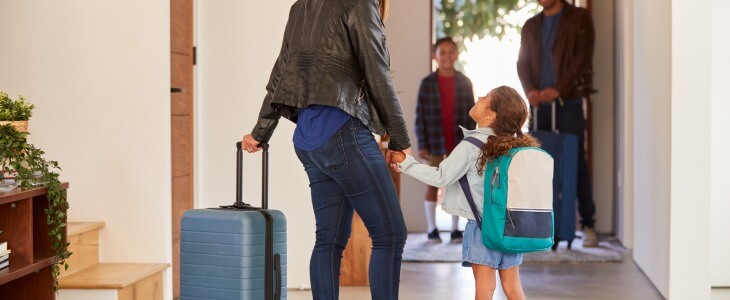Are you planning your next getaway in a cozy North Carolina Airbnb or VRBO rental? Imagine you’re enjoying your vacation when, suddenly, an accident occurs on the property. Who’s responsible? In this blog, we delve into the world of North Carolina’s vacation rental regulation, shedding light on potential mishaps and the legal complications that may be involved. Whether you’re an avid traveler or a host, understanding these aspects is crucial for a safe and enjoyable experience.
Understanding Short-Term Vacation Rentals
Airbnb & VRBO rentals have revolutionized the way people travel and host guests across North Carolina. This platform offers an array of unique and affordable lodging options, from charming cottages to luxurious city apartments. Travelers can immerse themselves in local culture by staying in residential neighborhoods or remote countryside hideaways, enjoying a more personalized and authentic experience.
Hosts, on the other hand, can turn their spare rooms or vacant properties into income generators. This flexibility attracts a diverse range of hosts, from homeowners seeking extra income to entrepreneurs managing multiple properties. However, with this convenience comes responsibility, as hosts must ensure the safety and well-being of their guests, and both guests and hosts must navigate legal responsibilities and potential liabilities in case of accidents or disputes.
In North Carolina, the relationship between guest and host is governed by the North Carolina Vacation Rental Act.
Common Vacation Rental Accidents
Common Airbnb rental accidents can ruin an otherwise great vacation. Slips, trips, and falls are prevalent, often due to inadequate maintenance or unaddressed hazards like loose tiles or wet surfaces. Inadequate security measures can also lead to accidents, as guests may find themselves in unsafe situations due to:
- poor lighting,
- faulty locks, or
- inadequate security systems.
Property defects and hazards, such as malfunctioning appliances or faulty wiring, pose additional risks.
These accidents can result in injuries ranging from minor bruises to severe trauma, and guests may seek compensation for medical bills and other damages. Understanding your rights and legal options is crucial in the event of an Airbnb rental accident.
Legal Responsibilities of Vacation Rental Hosts
Airbnb and VRBO hosts in North Carolina shoulder significant legal responsibilities to ensure the safety and well-being of their guests. The most fundamental duty is the “duty of care” principle, requiring hosts to maintain a safe environment and promptly address any potential hazards or maintenance issues. Hosts are also often required to adhere to specific safety and building code standards.
Insurance coverage is another important consideration, as hosts should maintain appropriate liability insurance to protect against potential accidents or property damage. Understanding these legal responsibilities is crucial, as failure to meet them can result in legal consequences and financial liabilities if a guest is injured during their stay.
Hosts and Their Responsibilities for a Guest’s Well-Being
In North Carolina, hosts bear the responsibility of taking reasonable measures to safeguard the well-being of their guests. This duty encompasses the obligation to address any potentially dangerous or hazardous conditions that exist on the property. In the event that a dangerous or hazardous situation exists, the host must either correct or warn the guest of the danger. If the host fails to fix the issue or warn of the condition, the host is exposed to liability for injuries that occur as a result of the dangerous condition.
Thus, adherence to safety protocols and the swift resolution of hazardous situations are crucial aspects of hosting responsibilities in North Carolina, ensuring a secure and protected environment for all guests.
Examples of hazardous situations for guests include:
- Slippery Surfaces: Wet floors, particularly in bathrooms or around swimming pools, can pose a slip hazard.
- Uneven Surfaces: Uneven flooring, hidden steps, loose carpets, or damaged walkways may contribute to trips and falls.
- Inadequate Lighting: Poorly lit areas increase the risk of accidents, especially during nighttime.
- Lack of Handrails: Staircases without proper handrails or balconies without safety features can be dangerous.
- Insufficient Signage: Failure to provide clear warnings or directions can lead to confusion and accidents.
- Defective Furniture or Equipment: Broken furniture, unstable fixtures, or malfunctioning appliances can cause harm.
- Poorly Maintained Decking: Decking that is not well-maintained can lead to structural issues, collapses, or trips and falls, posing risks to guests.
- Poorly Maintained Pool Areas: Swimming pools without proper maintenance or safety measures can pose drowning risks.
- Unmarked Hazards: Hazards that are not clearly identified or labeled, such as hidden steps, can catch guests off guard.
- Hazardous Conditions: Any conditions that could potentially harm guests, like toxic substances, mold, or infestations, should be addressed promptly.
- Poorly Maintained Grounds: Neglecting the maintenance of trees on the property can result in falling branches or unstable trees, posing risks to guests’ safety.
Liability in Vacation Rental Accidents
Liability in Airbnb and VRBO rental accidents can be complex, involving multiple parties. Hosts may bear responsibility if their negligence, such as inadequate maintenance or security measures, contributed to the accident. Airbnb or VRBO itself may also have liability in certain situations, particularly if it fails to address known safety issues on its platform.
Additionally, third-party vendors, like property management companies, may share liability if they played a role in the accident. To establish liability, it’s essential to prove negligence, demonstrating that a responsible party breached their duty of care, directly causing the accident and resulting in injuries.
Steps to Take After an Vacation Rental Accident
- Seek immediate medical attention: Your health is the top priority; ensure you receive proper care for any injuries sustained during the accident.
- Document the scene: Take photographs or videos of the accident site, injuries, and any potential hazards that contributed to the incident.
- Contact Airbnb or VRBO and the host: Notify Airbnb or VRBO about the accident and inform the host of the situation, ensuring they are aware of the incident.
- Preserve evidence: Keep all relevant documents, such as medical records, communications with Airbnb or VRBO and the host, and any evidence of the accident’s aftermath. This documentation can be crucial for a potential legal case.
Contact Bradford Law If You’ve Been Involved in an Vacation Rental Accident
At Bradford Law, we can help you face the aftermath of a vacation rental accident. Our team is experienced in handling personal injury cases, ensuring your rights are protected. We investigate liability, gather evidence, and build a strong case to maximize your compensation.
Don’t face the complexities of vacation rental accident cases alone. Reach out to Bradford Law today to secure dedicated legal representation and support.



